#victim blaming
Text
stop telling transmascs that terfs harrassing them is their fault. why the fuck did i just see a post imploring trans men to "examine why terfs feel comfortable" intruding in their spaces. It's because they're transphobic and have no respect for trans men's boundaries. How do you still not know this. fucking hell
5K notes
·
View notes
Text
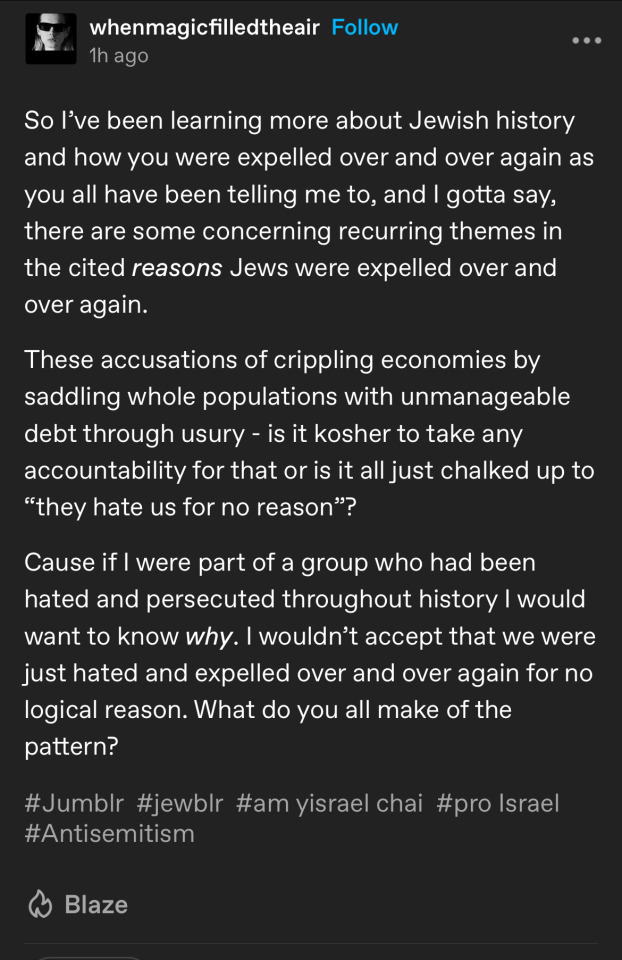
Love when the antisemites tag their own antisemitism. Let’s break it down.
1. “Jews getting expelled over and over again” is a common antisemitic talking point. On its own it isn’t antisemitic to acknowledge-it’s a historical fact- but as we will soon see, in this context it very much is a sign of antisemitism.
2. The use of the word “you” in “you were expelled” indicates this user is not Jewish.
3.”is it kosher to take any accountability for that” (crippling economies through usury)- here op illustrates that they believe the classic antisemitism that Jews willfully destroy economies through financial manipulation. In actuality, Jews were forced into economic work due to antisemitism, and then were used as scapegoats for economic failure.
4. Note the use of the word “kosher”. When used in this context it’s clearly derisive and meant to be ironic. I’m sure op thinks they’re very witty.
5. “They hate us for no reason”. Victim blaming. Bigotry is never the fault of the victim, and demanding that Jews take “accountability” for the antisemitism we face is yet again an antisemitic talking point. The historical and modern reasons for antisemitism are well documented, especially this specific flavor.
6. This last paragraph is more of the same, this time directly to Jews. “Have you ever thought about what you did to deserve the hate?” Is this paragraph summed up. “There must be some logical reason”-there is. Basic research makes this apparent. However instead op accuses Jews of complacency, subtly implying that it’s intentional, that we want to simply be viewed as victims.
7. Finally, note the tags. Jumblr, Israel tags even though this has nothing to do with Israel, the phrase “am yisrael chai”. Op knows what they’re doing and intentionally wants Jews to see their bigotry, under the thin plausible deniability of “I was just asking a question!” I do not think we should give them that benefit of the doubt. This is blatant antisemitism.
2K notes
·
View notes
Text
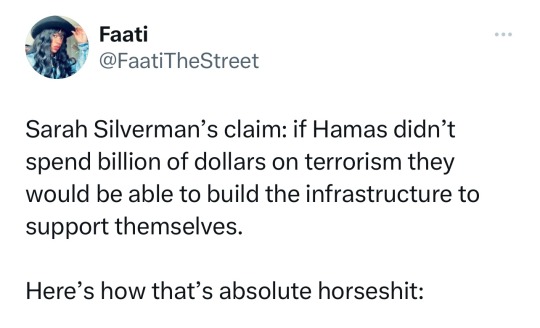


Hamas ≠ Palestine
👉🏿 https://www.amnesty.org/en/latest/campaigns/2017/11/the-occupation-of-water/
👉🏿 https://www.tumblr.com/odinsblog/730635185110073344
#politics#palestine#gaza#israel#sarah silverman#water rights#hamas ≠ palestine#war crimes#israel is an apartheid state#benjamin netanyahu is a war criminal#the occupation of water#military order 158#false media narratives#victim blaming#media propaganda#false narratives
1K notes
·
View notes
Text

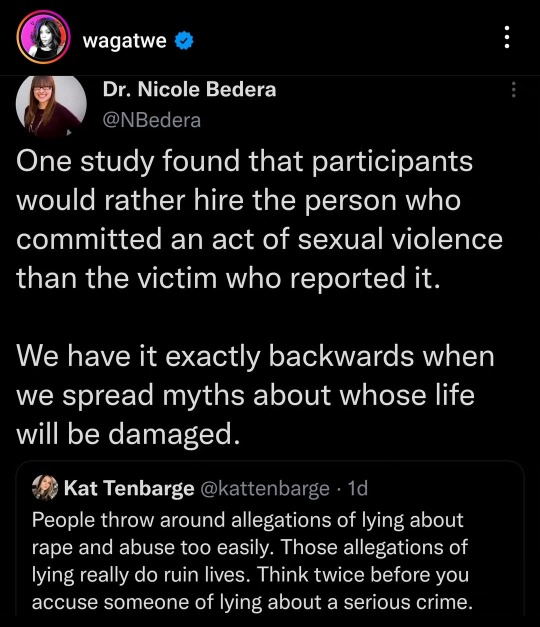

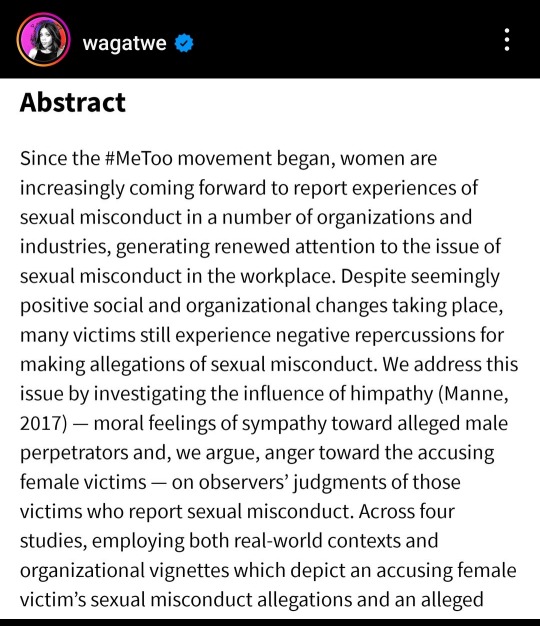
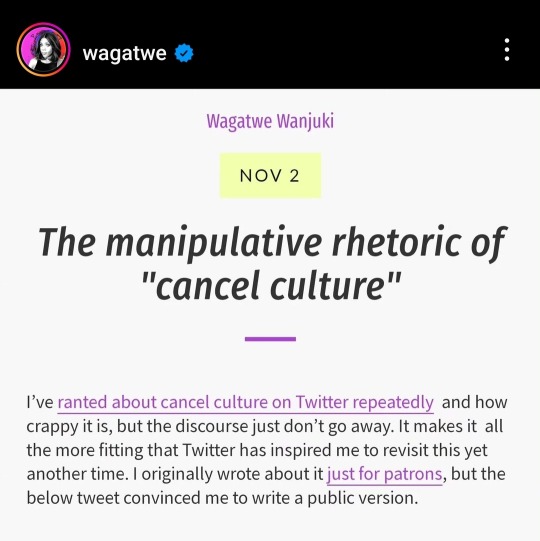
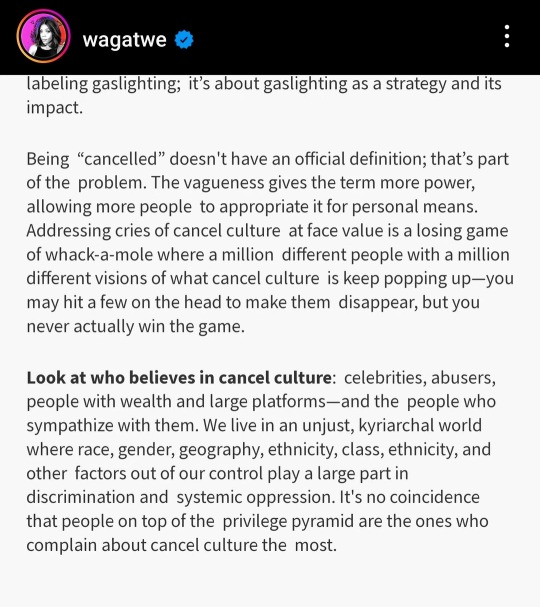
Link to Instagram post
2K notes
·
View notes
Text
religion will be like, it's because women talk to animals and eat fruit that childbirth is so painful, and the soil so hard to work! Not because we took away all of the midwives and created horrendous agriculture practices
#anti religion#blame shifting#victim blaming#radical feminism#anti christianity#anti patriarchy#pro midwife#pro no-dig gardening#anti agriculture
456 notes
·
View notes
Text
No, “convenience” isn’t the problem

I'm touring my new, nationally bestselling novel The Bezzle! Catch me in CHICAGO (Apr 17), Torino (Apr 21) Marin County (Apr 27), Winnipeg (May 2), Calgary (May 3), Vancouver (May 4), and beyond!

Using Amazon, or Twitter, or Facebook, or Google, or Doordash, or Uber doesn't make you lazy. Platform capitalism isn't enshittifying because you made the wrong shopping choices.
Remember, the reason these corporations were able to capture such substantial market-share is that the capital markets saw them as a bet that they could lose money for years, drive out competition, capture their markets, and then raise prices and abuse their workers and suppliers without fear of reprisal. Investors were chasing monopoly power, that is, companies that are too big to fail, too big to jail, and too big to care:
https://pluralistic.net/2024/04/04/teach-me-how-to-shruggie/#kagi
The tactics that let a few startups into Big Tech are illegal under existing antitrust laws. It's illegal for large corporations to buy up smaller ones before they can grow to challenge their dominance. It's illegal for dominant companies to merge with each other. "Predatory pricing" (selling goods or services below cost to prevent competitors from entering the market, or to drive out existing competitors) is also illegal. It's illegal for a big business to use its power to bargain for preferential discounts from its suppliers. Large companies aren't allowed to collude to fix prices or payments.
But under successive administrations, from Jimmy Carter through to Donald Trump, corporations routinely broke these laws. They explicitly and implicitly colluded to keep those laws from being enforced, driving smaller businesses into the ground. Now, sociopaths are just as capable of starting small companies as they are of running monopolies, but that one store that's run by a colossal asshole isn't the threat to your wellbeing that, say, Walmart or Amazon is.
All of this took place against a backdrop of stagnating wages and skyrocketing housing, health, and education costs. In other words, even as the cost of operating a small business was going up (when Amazon gets a preferential discount from a key supplier, that supplier needs to make up the difference by gouging smaller, weaker retailers), Americans' disposable income was falling.
So long as the capital markets were willing to continue funding loss-making future monopolists, your neighbors were going to make the choice to shop "the wrong way." As small, local businesses lost those customers, the costs they had to charge to make up the difference would go up, making it harder and harder for you to afford to shop "the right way."
In other words: by allowing corporations to flout antimonopoly laws, we set the stage for monopolies. The fault lay with regulators and the corporate leaders and finance barons who captured them – not with "consumers" who made the wrong choices. What's more, as the biggest businesses' monopoly power grew, your ability to choose grew ever narrower: once every mom-and-pop restaurant in your area fires their delivery drivers and switches to Doordash, your choice to order delivery from a place that payrolls its drivers goes away.
Monopolists don't just have the advantage of nearly unlimited access to the capital markets – they also enjoy the easy coordination that comes from participating in a cartel. It's easy for five giant corporations to form conspiracies because five CEOs can fit around a single table, which means that some day, they will:
https://pluralistic.net/2023/04/18/cursed-are-the-sausagemakers/#how-the-parties-get-to-yes
By contrast, "consumers" are atomized – there are millions of us, we don't know each other, and we struggle to agree on a course of action and stick to it. For "consumers" to make a difference, we have to form institutions, like co-ops or buying clubs, or embark on coordinated campaigns, like boycotts. Both of these tactics have their place, but they are weak when compared to monopoly power.
Luckily, we're not just "consumers." We're also citizens who can exercise political power. That's hard work – but so is organizing a co-op or a boycott. The difference is, when we dog enforcers who wield the power of the state, and line up behind them when they start to do their jobs, we can make deep structural differences that go far beyond anything we can make happen as consumers:
https://pluralistic.net/2022/10/18/administrative-competence/#i-know-stuff
We're not just "consumers" or "citizens" – we're also workers, and when workers come together in unions, they, too, can concentrate the diffuse, atomized power of the individual into a single, powerful entity that can hold the forces of capital in check:
https://pluralistic.net/2024/04/10/an-injury-to-one/#is-an-injury-to-all
And all of these things work together; when regulators do their jobs, they protect workers who are unionizing:
https://pluralistic.net/2023/09/06/goons-ginks-and-company-finks/#if-blood-be-the-price-of-your-cursed-wealth
And strong labor power can force cartels to abandon their plans to rig the market so that every consumer choice makes them more powerful:
https://pluralistic.net/2023/10/01/how-the-writers-guild-sunk-ais-ship/
And when consumers can choose better, local, more ethical businesses at competitive rates, those choices can make a difference:
https://pluralistic.net/2022/07/10/view-a-sku/
Antimonopoly policy is the foundation for all forms of people-power. The very instant corporations become too big to fail, jail or care is the instant that "voting with your wallet" becomes a waste of time.
Sure, choose that small local grocery, but everything on their shelves is going to come from the consumer packaged-goods duopoly of Procter and Gamble and Unilever. Sure, hunt down that local brand of potato chips that you love instead of P&G or Unilever's brand, but if they become successful, either P&G or Unilever will buy them out, and issue a press release trumpeting the purchase, saying "We bought out this beloved independent brand and added it to our portfolio because we know that consumers value choice."
If you're going to devote yourself to solving the collective action problem to make people-power work against corporations, spend your precious time wisely. As Zephyr Teachout writes in Break 'Em Up, don't miss the protest march outside the Amazon warehouse because you spent two hours driving around looking for an independent stationery so you could buy the markers and cardboard to make your anti-Amazon sign without shopping on Amazon:
https://pluralistic.net/2020/07/29/break-em-up/#break-em-up
When blame corporate power on "laziness," we buy into the corporations' own story about how they came to dominate our lives: we just prefer them. This is how Google explains away its 90% market-share in search: we just chose Google. But we didn't, not really – Google spends tens of billions of dollars every single year buying up the search-box on every website, phone, and operating system:
https://pluralistic.net/2024/02/21/im-feeling-unlucky/#not-up-to-the-task
Blaming "laziness" for corporate dominance also buys into the monopolists' claim that the only way to have convenient, easy-to-use services is to cede power to them. Facebook claims it's literally impossible for you to carry on social relations with the people that matter to you without also letting them spy on you. When we criticize people for wanting to hang out online with the people they love, we send the message that they need to choose loneliness and isolation, or they will be complicit in monopoly.
The problem with Google isn't that it lets you find things. The problem with Facebook isn't that it lets you talk to your friends. The problem with Uber isn't that it gets you from one place to another without having to stand on a corner waving your arm in the air. The problem with Amazon isn't that it makes it easy to locate a wide variety of products. We should stop telling people that they're wrong to want these things, because a) these things are good; and b) these things can be separated from the monopoly power of these corporate bullies:
https://pluralistic.net/2022/11/08/divisibility/#technognosticism
Remember the Napster Wars? The music labels had screwed over musicians and fans. 80 percent of all recorded music wasn't offered for sale, and the labels cooked the books to make it effectively impossible for musicians to earn out their advances. Napster didn't solve all of that (though they did offer $15/user/month to the labels for a license to their catalogs), but there were many ways in which it was vastly superior to the system it replaced.
The record labels responded by suing tens of thousands of people, mostly kids, but also dead people and babies and lots of other people. They demanded an end to online anonymity and a system of universal surveillance. They wanted every online space to algorithmically monitor everything a user posted and delete anything that might be a copyright infringement.
These were the problems with the music cartel: they suppressed the availability of music, screwed over musicians, carried on a campaign of indiscriminate legal terror, and lobbied effectively for a system of ubiquitous, far-reaching digital surveillance and control:
https://pluralistic.net/2023/02/02/nonbinary-families/#red-envelopes
You know what wasn't a problem with the record labels? The music. The music was fine. Great, even.
But some of the people who were outraged with the labels' outrageous actions decided the problem was the music. Their answer wasn't to merely demand better copyright laws or fairer treatment for musicians, but to demand that music fans stop listening to music from the labels. Somehow, they thought they could build a popular movement that you could only join by swearing off popular music.
That didn't work. It can't work. A popular movement that you can only join by boycotting popular music will always be unpopular. It's bad tactics.
When we blame "laziness" for tech monopolies, we send the message that our friends have to choose between life's joys and comforts, and a fair economic system that doesn't corrupt our politics, screw over workers, and destroy small, local businesses. This isn't true. It's a lie that monopolists tell to justify their abuse. When we repeat it, we do monopolists' work for them – and we chase away the people we need to recruit for the meaningful struggles to build worker power and political power.

If you'd like an essay-formatted version of this post to read or share, here's a link to it on pluralistic.net, my surveillance-free, ad-free, tracker-free blog:
https://pluralistic.net/2024/04/12/give-me-convenience/#or-give-me-death

Image:
Cryteria (modified)
https://commons.wikimedia.org/wiki/File:HAL9000.svg
CC BY 3.0
https://creativecommons.org/licenses/by/3.0/deed.en
340 notes
·
View notes
Text
abuser: spends years meticulously isolating, grooming, trapping and sabotaging victim to the point where they don't know they're abused, blame themselves, think abuse is just normal, feel no confidence about any of their skills, have no one and no way of survival if they escape, and they're aware their lives are threatened if they try
society: well why didn't the victim just leave if they didn't like it :/
#escaping abuse#abuse sabotage#toxic society#abuse denial#denial of reality#defending abuse#victim blaming#victim shaming
1K notes
·
View notes
Text
"Look at this. Look at what you've done. You caused all of this by being your fucking hurtable self. I was normal before I met you, but you fucking infected me with these thoughts and impulses.
You did this to me. This is your fault. You're not the victim here, I am. You've ruined me, not the other way around.
You messed up my mind to the point of doing this, and honestly? I think you deserve this for manipulating me like that."
#have a prompt in these trying times#a whumped tea#not edited#victim blaming#tw victim blaming#whump writing#whumpee#whump#whump community#whump prompt#whump scenario#whump ideas#whumper#whump idea#whump dialogue#whumper dialogue#dialogue prompt#character dialogue#writing dialogue#dialogue ideas#whumpblr#my prompt
212 notes
·
View notes
Text
You did not "manifest" poverty into your life.
You did not "manifest" abuse into your life.
You did not "manifest" illness or disability into your life.
Anyone who tells you differently is victim blaming, and you should not be listening to them.
#victim blaming#illness#disability#abuse#poverty#law of assumption#loa#law of attraction#manifestation#self compassion#witchblr#spiritual abuse
1K notes
·
View notes
Text
This fandom continues to be the absolute worst.
Just because a character is canonically a kinky masochist does not mean they 'want' to be abused.
Masochism =/= deserving abuse.
Even if Izzy got off on The Toe Thing (which I certainly believe he did in the first incident!) it was in no way consensual. It happened while he was sleeping.
I hate to break it to you, but people can orgasm while being raped or assaulted. Physical bodily response is NOT the same as consent, and I really hoped we were at a stage in 2023 where that was common knowledge. Apparently not.
As a one-off in Season 1, Ed's mutilation of Izzy was immensely fucked up, but still not a pattern. In Season 2 it became........ blatantly acknowledged on-screen as repeated physical abuse from a guy in a position of power over his subordinate? That Izzy did not enjoy in the slightest, but couldn't escape? That made him break down crying in Fang's arms while Frenchie held his hand? Like...??? How do you see that and interpret those scenes as proof that Izzy 'wanted it'?
Sometimes I'm reminded forcefully of how uneducated people are about kink, abuse, victim blaming, and consent in general. If you think people who enjoy pain in the bedroom are inviting abuse and 'deserve what they get', then frankly, I think your ignorant, kinkshaming, puritanical bullshit shouldn't be welcome in this fandom. It's genuinely harmful.
#ofmd#ofmd fandom critical#our flag means death#izzy hands#ed teach#izzy critical#ed teach critical#the izcourse#putting it there so the offenders might see it lol#wtf is wrong with these people. seriously. yikes.#victim blaming
239 notes
·
View notes
Text

Short one today, but quick and easy to break down.
First, let's look at the phrase "God's chosen people". The way this person is using it has certain implications: that Jews think we're better than goyim, that we are "chosen" and therefore consider ourselves superior to them. This is incorrect. While some people may consider themselves superior on an individual level, the meaning of "Chosen" in Jewish communities is "chosen to fulfil the mitzvot". It is essentially a burden, rather than a privilege.
The use of "Chosen" by antisemites is widespread, often paired with misquotes of the Talmud to paint a picture of an evil Jewish supremacy plot.
Furthermore, many religions believe that they are the one true way to be, some even threatening nonbelievers with eternal torment- something, incidentally, that Judaism does not do.
It is also important to acknowledge the victim blaming language of this entire post. From the perspective of this post, antisemitism is a logical reaction, as it is the action of Jews that makes people hate them.
I hope we can all see how this is bullshit.
672 notes
·
View notes
Text
This is your brain on fraud apologetics

In 1998, two Stanford students published a paper in Computer Networks entitled “The Anatomy of a Large-Scale Hypertextual Web Search Engine,” in which they wrote, “Advertising funded search engines will be inherently biased towards the advertisers and away from the needs of consumers.”
https://research.google/pubs/pub334/
If you’d like an essay-formatted version of this post to read or share, here’s a link to it on pluralistic.net, my surveillance-free, ad-free, tracker-free blog:
https://pluralistic.net/2023/02/24/passive-income/#swiss-cheese-security
The co-authors were Lawrence Page and Sergey Brin, and the “large-scale hypertextual web search-engine” they were describing was their new project, which they called “Google.” They were 100% correct — prescient, even!
On Wednesday night, a friend came over to watch some TV with us. We ordered out. We got scammed. We searched for a great local Thai place we like called Kiin and clicked a sponsored link for a Wix site called “Kiinthaila.com.” We should have clicked the third link down (kiinthaiburbank.com).
We got scammed. The Wix site was a lookalike for Kiin Thai, which marked up their prices by 15% and relayed the order to our local, mom-and-pop, one-branch restaurant. The restaurant knew it, too — they called us and told us they were canceling the order, and said we could still come get our food, but we’d have to call Amex to reverse the charge.
As it turned out, the scammers double-billed us for our order. I called Amex, who advised us to call back in a couple days when the charge posted to cancel it — in other words, they were treating it as a regular customer dispute, and not a systemic, widespread fraud (there’s no way this scammer is just doing this for one restaurant).
In the grand scheme of things, this is a minor hassle, but boy, it’s haunting to watch the quarter-century old prophecy of Brin and Page coming true. Search Google for carpenters, plumbers, gas-stations, locksmiths, concert tickets, entry visas, jobs at the US Post Office or (not making this up) tech support for Google products, and the top result will be a paid ad for a scam. Sometimes it’s several of the top ads.
This kind of “intermediation” business is actually revered in business-schools. As Douglas Rushkoff has written, the modern business wisdom reveres “going meta” — not doing anything useful, but rather, creating a chokepoint between people who do useful things and people who want to pay for those things, and squatting there, collecting rent:
https://rushkoff.medium.com/going-meta-d42c6a09225e
It’s the ultimate passive income/rise and grind side-hustle: It wouldn’t surprise me in the least to discover a whole festering nest of creeps on Tiktok talking about how they pay Mechanical Turks to produce these lookalike sites at scale.
This mindset is so pervasive that people running companies with billions in revenue and massive hoards of venture capital run exactly the same scam. During lockdown, companies like Doordash, Grubhub and Uber Eats stood up predatory lookalike websites for local restaurants, without their consent, and played monster-in-the-middle, tricking diners into ordering through them:
https://pluralistic.net/2020/09/19/we-are-beautiful/#man-in-the-middle
These delivery app companies were playing a classic enshittification game: first they directed surpluses to customers to lock them in (heavily discounting food), then they directed surplus to restaurants (preferential search results, free delivery, low commissions) — then, having locked in both consumers and producers, they harvested the surplus for themselves.
Today, delivery apps charge massive premiums to both eaters and restaurants, load up every order with junk fees, and clone the most successful restaurants out of ghost kitchens — shipping containers in parking lots crammed with low-waged workers cranking out orders for 15 different fake “virtual restaurants”:
https://pluralistic.net/2020/12/01/autophagic-buckeyes/#subsidized-autophagia
Delivery apps speedran the enshittification cycle, but Google took a slower path to get there. The company has locked in billions of users (e.g. by paying billions to be the default search on Safari and Firefox and using legal bullying to block third party Android device-makers from pre-installing browsers other than Chrome). For years, it’s been leveraging our lock-in to prey on small businesses, getting them to set up Google Business Profiles.
These profiles are supposed to help Google distinguish between real sellers and scammers. But Kiin Thai has a Google Business Profile, and searching for “kiin thai burbank” brings up a “Knowledge Panel” with the correct website address — on a page that is headed with a link to a scam website for the same business. Google, in other words, has everything it needs to flag lookalike sites and confirm them with their registered owners. It would cost Google money to do this — engineer-time to build and maintain the system, content moderator time to manually check flagged listings, and lost ad-revenue from scammers — but letting the scams flourish makes Google money, at the expense of Google users and Google business customers.
Now, Google has an answer for this: they tell merchants who are being impersonated by ad-buying scammers that all they need to do is outbid them for the top ad-spot. This is a common approach — Amazon has a $31b/year “ad business” that’s mostly its own platform sellers bidding against each other to show you fake results for your query. The first five screens of Amazon search results are 50% ads:
https://pluralistic.net/2022/11/28/enshittification/#relentless-payola
This is “going meta,” so naturally, Meta is doing it too: Facebook and Instagram have announced a $12/month “verification” badge that will let you report impersonation and tweak the algorithm to make it more likely that the posts you make are shown to the people who explicitly asked to see them:
https://www.vox.com/recode/2023/2/21/23609375/meta-verified-twitter-blue-checkmark-badge-instagram-facebook
The corollary of this, of course, is that if you don’t pay, they won’t police your impersonators, and they won’t show your posts to the people who asked to see them. This is pure enshittification — the surplus from users and business customers is harvested for the benefit of the platform owners:
https://pluralistic.net/2023/01/21/potemkin-ai/#hey-guys
The idea that merchants should master the platforms as a means of keeping us safe from their impersonators is a hollow joke. For one thing, the rules change all the time, as the platforms endlessly twiddle the knobs that determine what gets shown to whom:
https://doctorow.medium.com/twiddler-1b5c9690cce6
And they refuse to tell anyone what the rules are, because if they told you what the rules were, you’d be able to bypass them. Content moderation is the only infosec domain where “security through obscurity” doesn’t get laughed out of the room:
https://doctorow.medium.com/como-is-infosec-307f87004563
Worse: the one thing the platforms do hunt down and exterminate with extreme prejudice is anything that users or business-customers use to twiddle back — add-ons and plugins and jailbreaks that override their poor choices with better ones:
https://www.theverge.com/2022/9/29/23378541/the-og-app-instagram-clone-pulled-from-app-store
As I was submitting complaints about the fake Kiin scam-site (and Amex’s handling of my fraud call) to the FTC, the California Attorney General, the Consumer Finance Protection Bureau and Wix, I wrote a little Twitter thread about what a gross scam this is:
https://twitter.com/doctorow/status/1628948906657878016
The thread got more than two million reads and got picked up by Hacker News and other sites. While most of the responses evinced solidarity and frustration and recounted similar incidents in other domains, a significant plurality of the replies were scam apologetics — messages from people who wanted to explain why this wasn’t a problem after all.
The most common of these was victim-blaming: “you should have used an adblocker” or “never click the sponsored link.” Of course, I do use an ad-blocker — but this order was placed with a mobile browser, after an absentminded query into the Google search-box permanently placed on the home screen, which opens results in Chrome (where I don’t have an ad-blocker, so I can see material behind an ad-blocker-blocker), not Firefox (which does have an ad-blocker).
Now, I also have a PiHole on my home LAN, which blocks most ads even in a default browser — but earlier this day, I’d been on a public wifi network that was erroneously blocking a website (the always excellent superpunch.net) so I’d turned my wifi off, which meant the connection came over my phone’s 5G connection, bypassing the PiHole:
https://pluralistic.net/2022/04/28/shut-yer-pi-hole/
“Don’t click a sponsored link” — well, the irony here is that if you habitually use a browser with an ad-blocker, and you backstop it with a PiHole, you never see sponsored links, so it’s easy to miss the tiny “Sponsored” notification beside the search result. That goes double if you’re relaxing with a dinner guest on the sofa and ordering dinner while chatting.
There’s a name for this kind of security failure: the Swiss Cheese Model. We all have multiple defenses (in my case: foreknowledge of Google’s ad-scam problem, an ad-blocker in my browser, LAN-wide ad sinkholing). We also have multiple vulnerabilities (in my case: forgetting I was on 5G, being distracted by conversation, using a mobile device with a permanent insecure search bar on the homescreen, and being so accustomed to ad-blocked results that I got out of the habit of checking whether a result was an ad).
If you think you aren’t vulnerable to scams, you’re wrong — and your confidence in your invulnerability actually increases your risk. This isn’t the first time I’ve been scammed, and it won’t be the last — and every time, it’s been a Swiss Cheese failure, where all the holes in all my defenses lined up for a brief instant and left me vulnerable:
https://locusmag.com/2010/05/cory-doctorow-persistence-pays-parasites/
Other apologetics: “just call the restaurant rather than using its website.” Look, I know the people who say this don’t think I have a time-machine I can use to travel back to the 1980s and retrieve a Yellow Pages, but it’s hard not to snark at them, just the same. Scammers don’t just set up fake websites for your local businesses — they staff them with fake call-centers, too. The same search that takes you to a fake website will also take you to a fake phone number.
Finally, there’s “What do you expect Google to do? They can’t possibly detect this kind of scam.” But they can. Indeed, they are better situated to discover these scams than anyone else, because they have their business profiles, with verified contact information for the merchants being impersonated. When they get an ad that seems to be for the same business but to a different website, they could interrupt the ad process to confirm it with their verified contact info.
Instead, they choose to avoid the expense, and pocket the ad revenue. If a company promises to “to organize the world’s information and make it universally accessible and useful,” I think we have the right to demand these kinds of basic countermeasures:
https://www.google.com/search/howsearchworks/our-approach/
The same goes for Amex: when a merchant is scamming customers, they shouldn’t treat complaints as “chargebacks” — they should treat them as reports of a crime in progress. Amex has the bird’s eye view of their transaction flow and when a customer reports a scam, they can backtrack it to see if the same scammer is doing this with other merchants — but the credit card companies make money by not chasing down fraud:
https://www.buzzfeednews.com/article/rosalindadams/mastercard-visa-fraud
Wix also has platform-scale analytics that they could use to detect and interdict this kind of fraud — when a scammer creates a hundred lookalike websites for restaurants and uses Wix’s merchant services to process payments for them, that could trigger human review — but it didn’t.
Where do all of these apologetics come from? Why are people so eager to leap to the defense of scammers and their adtech and fintech enablers? Why is there such an impulse to victim-blame?
I think it’s fear: in their hearts, people — especially techies — know that they, too, are vulnerable to these ripoffs, but they don’t want to admit it. They want to convince themselves that the person who got scammed made an easily avoidable mistake, and that they themselves will never make a similar mistake.
This is doubly true for readerships on tech-heavy forums like Twitter or (especially) Hacker News. These readers know just how many vulnerabilities there are — how many holes are in their Swiss cheese — and they are also overexposed to rise-and-grind/passive income rhetoric.
This produces a powerful cognitive dissonance: “If all the ‘entrepreneurs’ I worship are just laying traps for the unwary, and if I am sometimes unwary, then I’m cheering on the authors of my future enduring misery.” The only way to resolve this dissonance — short of re-evaluating your view of platform capitalism or questioning your own immunity to scams — is to blame the victim.
The median Hacker News reader has to somehow resolve the tension between “just install an adblocker” and “Chrome’s extension sandbox is a dumpster fire and it’s basically impossible to know whether any add-on you install can steal every keystroke and all your other data”:
https://mattfrisbie.substack.com/p/spy-chrome-extension
In my Twitter thread, I called this “the worst of all possible timelines.” Everything we do is mediated by gigantic, surveillant monopolists that spy on us comprehensively from asshole to appetite — but none of them, not a 20th century payment giant nor a 21st century search giant — can bestir itself to use that data to keep us safe from scams.
Next Thu (Mar 2) I'll be in Brussels for Antitrust, Regulation and the Political Economy, along with a who's-who of European and US trustbusters. It's livestreamed, and both in-person and virtual attendance are free:
https://www.brusselsconference.com/registration
On Fri (Mar 3), I'll be in Graz for the Elevate Festival:
https://elevate.at/diskurs/programm/event/e23doctorow/
[Image ID: A modified version of Hieronymus Bosch's painting 'The Conjurer,' which depicts a scam artist playing a shell-game for a group of gawking rubes. The image has been modified so that the scam artist's table has a Google logo and the pea he is triumphantly holding aloft bears the 'Sponsored' wordmark that appears alongside Google search results.]
#pluralistic#victim blaming#fraud#going meta#douglas rushkoff#ad-tech#local search#wix#amex#thai food#business#rent-seeking#entrepreneurship#passive income#chokepoint capitalism#platform lawyers
2K notes
·
View notes
Text
When abusers pretend you actually control their actions during the abuse it's almost laughable, you're doing this because of something I did? Really? I control you? I decide what you do? In that case get down on your knees apologize for what you did to me. Cry and beg for forgiveness and spend next 10 years repenting for your crimes. No? You won't? Then maybe I don't control what you do. If I did I know what I would be making you do.
No victim ever controlled what their abuser did to them. If they did, they would have stopped the abuse before it even started. No abuser abuses because of something the victim did. They do it out of their own volition, nobody forces them. The victims have zero responsibility for any act of abuse towards them. No victim deserved it. No victim wanted it. No victim was in control. Abusers take control both of themselves and the victim, then blame the victims for the crimes against them. Do not buy into their lies.
#victim blaming#shifting blame on victims#abusers#psychological abuse#darvo#victim shaming#pretending victims can control abusers
790 notes
·
View notes
Text
One glance, eternal mistake.
Zhongli x God!Reader
Angst with no comfort, regret, mention of death, character dying, blaming someone innocent.
"maybe it would have been better if we have never met y/n."
Summary: Y/n falling in love with the god of contract, who knew it would turn out this way.

_____________________________________________
Stars of the teyvat... Yes, the fake sky and the stars. Y/n was indeed a magical creature type of god. Y/h color with a fading midnight blue to blend in with the sky, her eyes glowing like the stars that rises of up in the middle of the night. Watching all over teyvat, reporting back to the heavenly principles.
Y/n was no strong or weak god, all she could do is control over stars and look over the world. Until she fell from sky when khaenri'ah's fall started. Watching archon's destroying the innocent khaenri'ah people turning into a monster. She can't interfere, it would be illegal to the laws of teyvat and would get punishment from the upper gods.
She wake up at the mountains of liyue, Morax's territory.
Traveling around the liyue and bumping to morax accidentally, of course from her appearance morax would know she was not a ordinary mortal.
"you are not from here are you?" A cold masculine voice sent shivers down her spine. From his gaze and his stand she knew she was not a match for him.
"I came from the stars, the sky, god of contract. I watch all over the teyvat." She tried to look at him like he looked at her, trying to scare him. Well that was a dumb mistake that lent her to embarrassment.
"I see mind exchanging names, heavenly god." Who was y/n to decline that offer. Time by time they got to know each other, they made lots of friends and had fun hanging out.
All teyvat knows a heavenly god shouldn't be falling in love with someone on teyvat. Principles knows why that stupid law was there, y/n can't put up with her feeling that called 'love'. İt made her like a person who is too drunk, can't find a way to stop her day dreaming about morax. She can't keep running away from him.
She loved him so much it was hurting. Everytime she see how he looked at guizhong with those eyes, it hurt. Everytime he hold her hand it hurt. Jealousy was filled in her head but who was she to do something bad to guizhong.
The day came and y/n was ready to confess her feelings, walking to the Qingyun Peak with a foolish smile on her face.
"I'm sorry y/n but my feelings belong to guizhong." Yes, a foolish smile on her face. Which place you look you can see her face slowly turning to a sad expression. Tear in her eyes as she lowered her head accepting the truth.
They returned back to liyue harbor in silent, not saying and words to each other like they used to. Sharing a few glances but looking away quickly trying not to disturb each others presence. Or that's what morax thought, how could she be disturbed by him being next to her. That's what she needed after all.
Only after a few days, everything fell apart. Everyone turning their backs on you, you never knew why until the guizhongs death rumors came to her ears. Quickly searching for morax only to be met by his angry face towards her.
"Why are you looking at me like that morax?" That's right she doesn't know why, why did everyone suddenly turned their back on her, why did guizhong die, why morax was looking at her like he was disgusted?
"Are you really going to act like you don't know? İs that it y/n? Were you so jealous that you had to kill her?" No...no she really didn't understand what was going on.
"What are you talking about morax, I didn't do such a thing!"
"Watching over teyvat? What an absurd thing for a god. Watching over teyvat so you could spot guizhong and kill her?" Morax scoffed at the first part of his sentence, making you tear up.
"İt's not an absurd thing! İf it weren't me this world would have been nothing but a chess piece for heavenly principles! I don't use my power to kill someone morax." She ended her sentence.
"Really? So why the liyue's people are telling that they witnessed you killing guizhong?! Maybe it would have been better if we have never met y/n." The ground started to rumble as he shouted.
"I didn't do it, I am telling you! I would have already be killed by principles if I did that to a minor god!" She shouted back.
Back and forth arguing for 20 minutes led them nothing but a prison inside the cave for y/n. She did nothing wrong, it wasn't her. No creature would look exactly like her.
Days after days, weeks after week and a month. She was stuck inside that cave that morax threw her in. The rumors started to vanish like a wind. Y/n already gave up there were no stars inside the cave and she couldn't watch over teyvat. She knew she was going to be executed. Heavenly principles already planned her execution.
The false rumor reached to everyone's ear in Liyue, it wasn't y/n who killed but her another creature sent by upper gods. God of contract, morax was devastated hearing the news. He was walking to the cave where you were in really fast almost sprinting.
Only to be met by you who was already got killed, a spear pierced through your chest as you looked at him smiling for the last time. Throwing himself on to her, catching her before she fall to the ground, Holding you.
"I lied y/n, my heart and my body only belongs to you, my feelings too. I was a coward y/n, I couldn't say it that they but I really thought it was you who killed her, I was wrong. I was wrong for the first time and I am letting you die like this." He confessed.
"İt was probably principles order morax don't blame yourself" y/n said through her coughes.
"how can I not? I shouldn't have done this in first place at all. I should have trusted you, I love you so much but I couldn't trust y/n. Don't forgive someone like me."
"Morax..." Her breathing got slower.
"No...no don't- just don't die on me like this! We still have lots to do y/n, once we get back to Liyue we can spend our times together! So...please.." his voice broke at the end begging to her stay more. She caressed his cheek wiping his tears away.
"Morax, I'm getting sleepy..." Her hand fall to the ground closing her eyes and breathing his scent in for the last time.
"I understand, please sleep well my love. Dream about being on the sky and flying around the stars again my dear..." He carried her body to a high mountain that had great views at night.
He sat next to her grave watching the stars that no longer shine as bright as before. The feeling of guilt pressing down on his heart, crying like a toddler. He looked up the sky once again as he saw a shooting star.
"you must be flying freely now, you look happy."

#genshin impact#genshin impact x reader#zhongli#zhongli x reader#zhongli angst#angst with no comfort#reader angst#zhongli x you#regret#victim blaming
217 notes
·
View notes